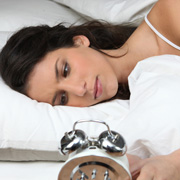 Erwin Wodicka/PhotoSpin
Erwin Wodicka/PhotoSpin
Loud snoring may be more than just annoying. It can be a symptom of a serious sleep disorder known as sleep apnea. Recent studies show that treating a sleep illness for yourself or your sleep partner may be critical in helping both of you maintain a healthy lifestyle.
Sleep apnea is a condition that leads to pauses in breathing or taking shallow breaths while sleeping. Although the condition is chronic, occurring most nights when you sleep, it is often undiagnosed. That is, unless a family member or bed partner notices that you are not breathing evenly, or complains that you are snoring loudly.
The most common type of sleep apnea is obstructive sleep apnea (OSA). In this case, the airway may collapse or become blocked during sleep, cutting off the flow of air.
You may experience long pauses between breaths or take shallow breaths that are accompanied by loud snoring. After a pause in breathing, you may make a loud snort or choking sound as you take another breath.
This uneven pattern of breathing often prevents sufferers from staying in deep sleep, leading to sleep deprivation. The loud noises accompanying sleep may also wake your bed partner or keep him or her from falling asleep.
Sleep apnea can have serious effects on your health.
One study conducted in Asia showed that the overall death rate was 2.5 times higher in Asians with sleep apnea. The study also showed that people with severe OSA had more than four times higher risk of death from cardiovascular conditions.
In Australia, researchers concluded that untreated OSA leads to sleepy drivers and an increased risk of automotive crashes in men. They also recorded more near-misses on the road for both men and women with OSA. People with OSA reportedly experienced three times as many motor vehicle crashes as people without OSA.
Sleep apnea can affect your overall health in many significant ways. When you have disruptions in your breathing, your body may not get the oxygen it needs to maintain optimum health. If you suspect you or your bed partner may have sleep apnea, talk to your health care professional.
Sources:
National Heart, Lung, and Blood Institute. What Is Sleep Apnea? Web. March 11, 2014.
http://www.nhlbi.nih.gov/health/health-topics/topics/sleepapnea
Science Daily. Sleep is critical to maintaining a healthy lifestyle. Web. March 11, 2014.
http://www.sciencedaily.com/releases/2013/10/131015094512.htm
Reviewed March 12, 2014
by Michele Blacksberg RN
Edited by Jody Smith






Add a CommentComments
There are no comments yet. Be the first one and get the conversation started!